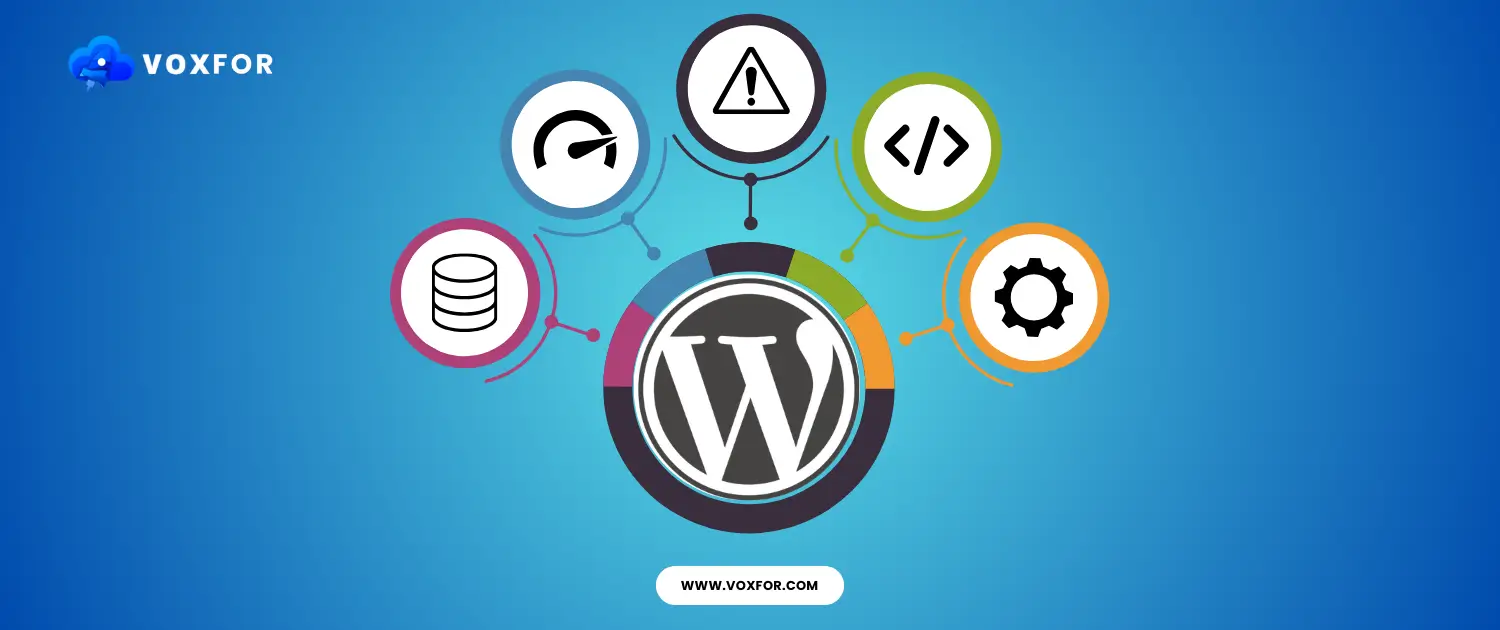- Lifetime Solutions
VPS SSD:
Lifetime Hosting:
- VPS Locations
- Managed Services
- Support
- WP Plugins
- Concept

WordPress Performance Issues can frustrate both you and your visitors. Page loads creep along, the database groans under heavy queries, and you might spend hours trying to pinpoint the root cause. Whether you’re a developer maintaining complex client sites or a site owner wanting to improve performance, understanding how to debug performance issues is vital.
This article provides detailed info about diagnosing and fixing performance bottlenecks—focusing on database queries, plugin load order, and related issues. We’ll cover how to enable debugging features like WP_DEBUG and SAVEQUERIES, use powerful tools such as Query Monitor, and explore profiling with Xdebug or Tideways. We’ll also delve into how to spot problematic hooks, excessive caching, and other common pitfalls that slow down WordPress.
A fast WordPress site delivers a better user experience, improves SEO, and can boost conversions. When performance dips, it can be due to a variety of factors:
By learning how to debug performance issues, you’ll gain the skills to identify these problems and apply targeted solutions. The first step is setting up an environment where you can safely diagnose and test performance issues.
Before diving into performance debugging, you need a proper environment. Ideally, work on a staging or local copy of your WordPress site. Debugging on a live site can disrupt the visitor experience unless you have no other choice.

Recommended steps:
Enable WP_DEBUG and SAVEQUERIES:
In wp-config.php, set:
define( 'WP_DEBUG', true );
define( 'WP_DEBUG_LOG', true );
define( 'WP_DEBUG_DISPLAY', false );For database query logging:
define( 'SAVEQUERIES', true );
Database queries often represent the “heartbeat” of your WordPress site’s performance. Every page load triggers multiple queries—fetching posts, retrieving options, and loading user data. In a healthy site, these queries are efficient and few. In a poorly optimized site, you might see dozens or even hundreds of queries, some running multiple times unnecessarily.

When you set SAVEQUERIES to true, WordPress stores all queries in the $wpdb->queries array. After a page load, you can inspect this array by logging it or using a debugging tool:
global $wpdb;
var_dump( $wpdb->queries );This dumps all queries, their execution time, and where they originated (file and line number). Look for:
Query Monitor is a must-have for performance debugging. After installation and activation, it adds a menu in the admin toolbar. From there, you can:
This information helps you see if a particular plugin is generating too many queries, if the theme’s functions.php is causing slowdowns, or if a custom code snippet is running inefficient SQL.
Once you’ve identified problematic queries, consider optimizations:
The WordPress lifecycle involves loading must-use plugins, then normal plugins, the theme, and finally firing a series of action and filter hooks. If certain plugins depend on code that has yet to load or if hooks fire too often, performance can suffer.
Query Monitor doesn’t just show queries—it can also show you which hooks fired and in what order. This analysis reveals if a certain hook is triggered multiple times unnecessarily or if a plugin attaches expensive operations to a commonly used hook (like init or the_content).
Check for:
If Query Monitor shows suspicious activity, open the plugin’s code. Look for add_action() or add_filter() calls:
Refactor these hooks to run when needed. For instance, move code that runs on every page load to a pre_get_posts hook that only changes queries for the front page or conditionally run the code based on user roles or page types.
Sometimes, there are other culprits than database queries. Maybe the PHP code is looping too many times, or external API calls slow things down. That’s where a full profiler comes in.
Xdebug is a PHP extension that provides extensive debugging and profiling capabilities. When enabled in your local environment:
This level of detail can show you if a plugin’s function is called repeatedly or if a complex regex in your theme’s functions.php is slowing things down.
Tideways is a SaaS and on-premises solution that offers continuous profiling of your PHP application. It shows transaction traces database queries and helps identify slow requests in production environments. Unlike Xdebug, Tideways can run with minimal overhead on a live site, making it easier to catch performance issues that occur under real traffic.
Caching is an effective way of enhancing performance, but if misused, it can backfire. Object caching (with Redis or Memcached) and transients store data to avoid repeated queries. However, if the cache is never invalidated or is too large, it can cause slow retrieval.
Use Query Monitor to see how many objects are fetched from the cache. If you see hundreds of cache calls, it might mean:
Reload the page and clear the cache. If performance improves temporarily, the cache might be storing outdated data. Consider using shorter expiration times or more targeted caching strategies.
Transients store data in the wp_options table by default. If you have a large number of transients that never expire, they can bloat your options table. Use a plugin like Transients Manager to review and clean them up.
If certain transients are expensive to regenerate, ensure that the code that sets them only runs when necessary. For example, run expensive queries on a schedule (using WP-Cron) and store results in a transient so regular page loads retrieve them instantly.
Even if your database queries and plugins are well-optimized, external factors can affect performance:
While these aren’t database or plugin load order issues, they contribute to overall performance. Use tools like GTmetrix or Google PageSpeed Insights to see which requests take the longest. If a plugin relies heavily on external APIs, consider caching their responses locally to reduce latency.
If you discover certain operations run multiple times per page load, consider the following:
Check Conditional Logic:
Wrap expensive operations in conditions:
add_action( 'wp', 'my_expensive_function' );
function my_expensive_function() {
if ( is_home() ) {
// Only run this code on the homepage
do_expensive_thing();
}
}
If you find plugins or custom code using query_posts() to alter queries, know that query_posts() replaces the main query and runs it again, causing performance overhead. Instead, use the pre_get_posts filter to modify queries before they run:
add_action( 'pre_get_posts', 'modify_main_query' );
function modify_main_query( $query ) {
if ( $query->is_main_query() && !is_admin() ) {
$query->set( 'posts_per_page', 5 );
}
}This approach preserves pagination and other query parameters without extra database loads.

Some plugins rely on others or load their code at awkward times:
If you’ve optimized queries, reduced hooks, and still experience slow responses, the issue might lie at the server level:
Imagine you have a WooCommerce store and notice the shop page loads slowly:
Optimize Query or Cache Results:
Add a transient:
function get_recommendations() {
$cached = get_transient( 'product_recommendations' );
if ( false !== $cached ) {
return $cached;
}
$query = new WP_Query([
'post_type' => 'product',
'meta_key' => 'featured',
'meta_value' => 'yes',
'posts_per_page' => 5,
]);
set_transient( 'product_recommendations', $query->posts, HOUR_IN_SECONDS );
return $query->posts;
}
Check Hook Placement:
If the code runs on every archive page, restrict it to the shop page only:
add_action( 'woocommerce_before_shop_loop', 'my_recs_logic' );
function my_recs_logic() {
if ( ! is_shop() ) {
return;
}
$recs = get_recommendations();
// Display recommendations
}
Debugging performance issues in WordPress—especially those related to database queries or plugin load order—requires a systematic approach. Start by enabling WP_DEBUG and SAVEQUERIES, then use Query Monitor to check which queries are affecting performance and check suspicious hooks. If needed, add deeper profiling with Xdebug or Tideways to locate bottlenecks in your PHP code.
Once you’ve identified issues, optimize queries, adjust hook firing times cache results, and consider upgrading hosting resources if necessary. With persistence and the right tools, you can turn a sluggish WordPress site into a responsive and efficient one, providing a better experience for your visitors and peace of mind for yourself.
God willing, this guide helps you develop the skills to diagnose and address performance issues in your WordPress projects, ensuring that your site remains fast, stable, and user-friendly.

Hassan Tahir wrote this article, drawing on his experience to clarify WordPress concepts and enhance developer understanding. Through his work, he aims to help both beginners and professionals refine their skills and tackle WordPress projects with greater confidence.